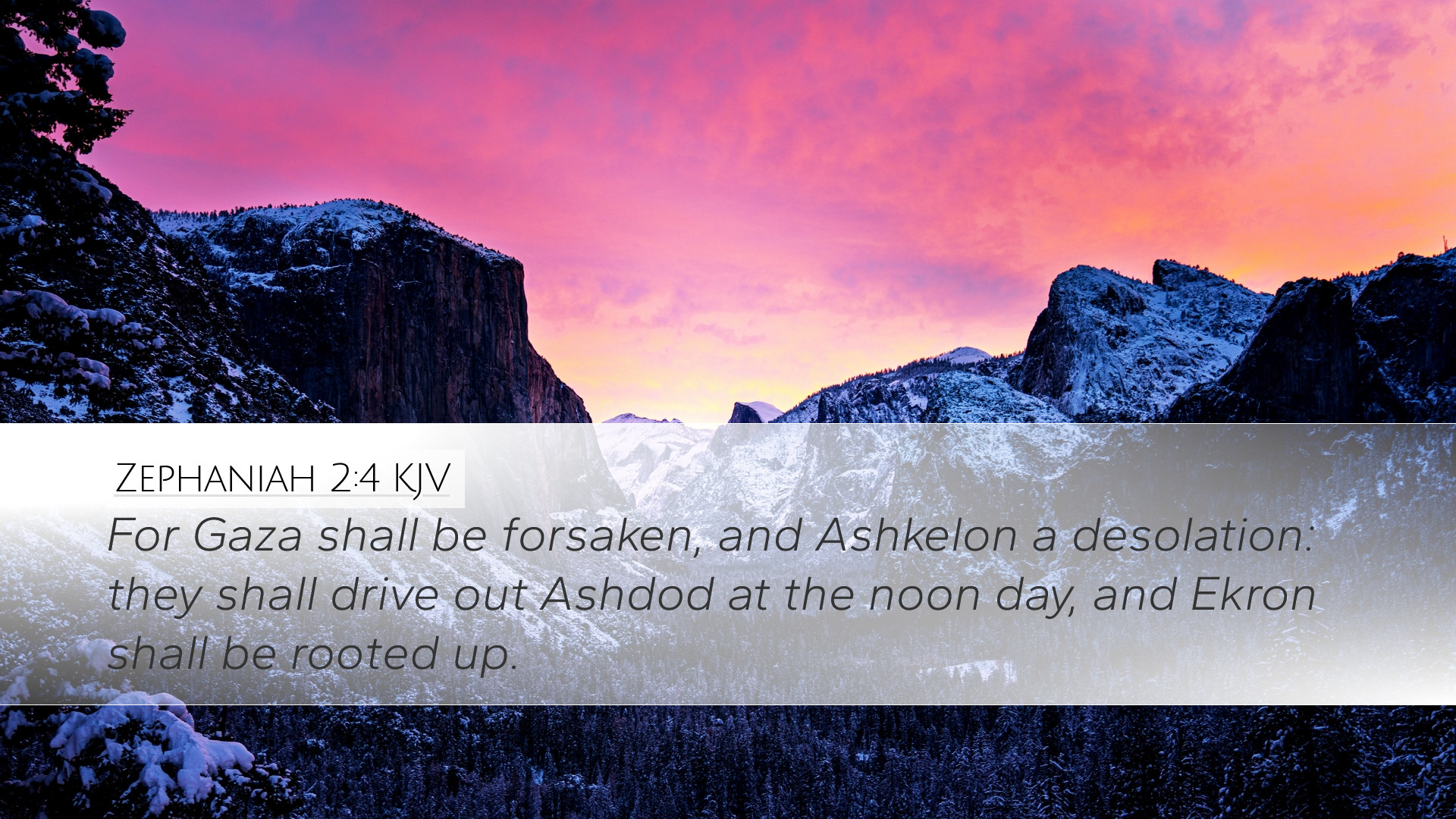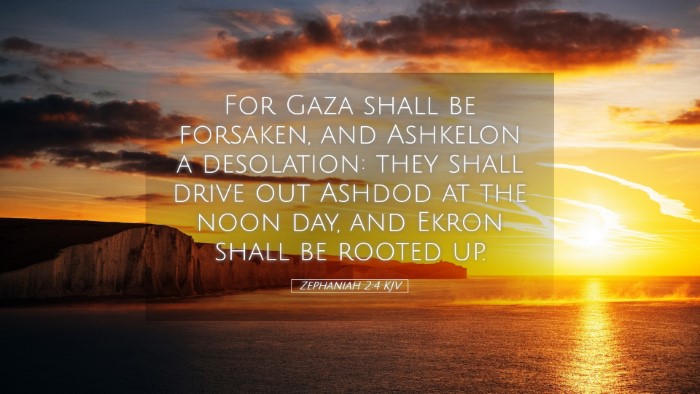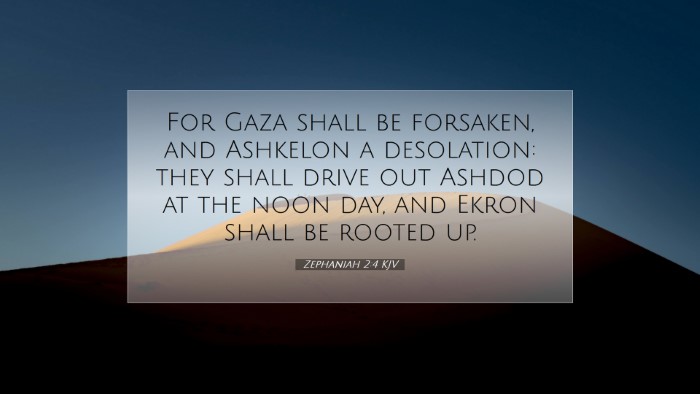Old Testament
Genesis Exodus Leviticus Numbers Deuteronomy Joshua Judges Ruth 1 Samuel 2 Samuel 1 Kings 2 Kings 1 Chronicles 2 Chronicles Ezra Nehemiah Esther Job Psalms Proverbs Ecclesiastes Song of Solomon Isaiah Jeremiah Lamentations Ezekiel Daniel Hosea Joel Amos Obadiah Jonah Micah Nahum Habakkuk Zephaniah Haggai Zechariah MalachiZephaniah 2:4
Zephaniah 2:4 KJV
For Gaza shall be forsaken, and Ashkelon a desolation: they shall drive out Ashdod at the noon day, and Ekron shall be rooted up.
Zephaniah 2:4 Bible Commentary
Commentary on Zephaniah 2:4
Verse Reference: Zephaniah 2:4 - "For Gaza shall be forsaken, and Ashkelon a desolation: they shall drive out Ashdod at the noon day, and Ekron shall be rooted up."
Historical Context
Zephaniah prophesied during a tumultuous time in Judah’s history, likely during the reign of King Josiah (640-609 BC). The northern kingdom of Israel had already fallen to Assyria, and Judah, though experiencing a religious revival under Josiah, faced an impending threat from surrounding nations.
This prophecy addresses significant Philistine cities, indicating impending judgment not just upon Judah but also upon their historical enemies, the Philistines. Understanding this context is crucial for interpreting the nature and purpose of God’s judgment.
Key Themes
- Judgment: The verse indicates God's sovereignty over nations and His power to bring judgment upon those who oppose His plans and people.
- Desolation: The words used—'forsaken' and 'desolation'—underscore the totality of God’s judgment. Such terms signify a complete cessation of the former glory and vibrancy of these cities.
- Divine Sovereignty: The prophecy serves as a reminder that despite the apparent power of foreign nations, it is the Lord who remains in control.
Commentary Insights
Matthew Henry’s Commentary:
Henry emphasizes the certitude of God's judgments against the Philistines, suggesting that the desolation of Gaza, Ashkelon, Ashdod, and Ekron serves a dual purpose: it is both a punishment for the actions of the Philistines, who were perpetual enemies of Israel, and a demonstration of God’s unwavering commitment to His covenant people.
The term “forsaken” implies a divine abandonment—where once God might have allowed these cities to prosper, their rejection of Him and hostility towards His people resulted in desolation. This serves a wider theological theme: that the rejection of God leads to inevitable ruin.
Albert Barnes’ Notes:
Barnes expands on the geographical significance of these cities. Gaza was one of the five chief cities of the Philistines and had a rich history of warfare against Israel. Barnes points out that the prophecy’s immediate fulfillment can be seen in Babylon’s conquest of these cities, reinforcing the message that God uses other nations as instruments of His will, illustrating His power over all creation.
Barnes further remarks on the phrase “drive out” which indicates the scale of both human and divine action—warriors will evict inhabitants at high noon, a time typically associated with brightness and clarity, symbolizing God's unhidden judgment that will transpire openly and undoubtedly.
Adam Clarke’s Commentary:
Clarke highlights the prophetic nature of Zephaniah's words and their accuracy in historical accounts. He notes that the prophetic warning serves as an enduring lesson: the fate of these cities stands as a stark reminder to all nations about the consequences of turning away from God. Clarke ties the prophecy back to the moral condition of the people involved, emphasizing that a nation's spiritual health directly correlates to its physical and geopolitical condition.
Clarke also examines the fiery judgment that awaited these cities, underscoring that even in their strategic importance, God’s judgment rendered them powerless. Thus, the phrase "rooted up" points to the total destruction from which there would be no return, encapsulating divine retribution against persistent sin.
Theological Reflections
This verse invites significant theological reflection, particularly regarding the interconnectedness of God’s justice and the historical narrative of His people. The prophetic assurance that God will deal with Israel’s enemies encourages faithfulness in God’s people, motivating them to remain steadfast even amid trials.
The ultimate question raised by these prophecies concerns the nature of God’s power: does God actively ensure justice on Earth, or do His judgments reveal a larger cosmic order? Reflecting on this brings us to consider how contemporary believers can view the 'Gaza' and 'Ashkelon' of today—places where injustice reigns and where believers might encourage renewal and restoration.
This passage prompts us to consider the enduring validity of justice in God’s kingdom. As believers, how do we interpret the desolation of nations and societies that turn their backs on the divine? Are we, in our ministry, willing to heed these warnings and strive towards a more faithful representation of God’s kingdom here on Earth?
Application for Today
- Encouragement for Ministry: Pastors and leaders can derive courage from this verse in their efforts to champion justice, knowing that God is actively involved in the affairs of nations.
- Calls for Reflection: This verse calls all believers to reflect on their own lives and national ethos—are there areas where God might be calling for repentance?
- Historical Awareness: For scholars and students, this emphasizes the importance of historical context in Biblical interpretation, specifically the role of cultural and political dynamics in understanding God’s word.
- Restorative Action: As societies face desolation today, this passage can motivate collective action towards restoration, insisting that humanity, when aligned with divine mandates, can rebuild what was lost.


